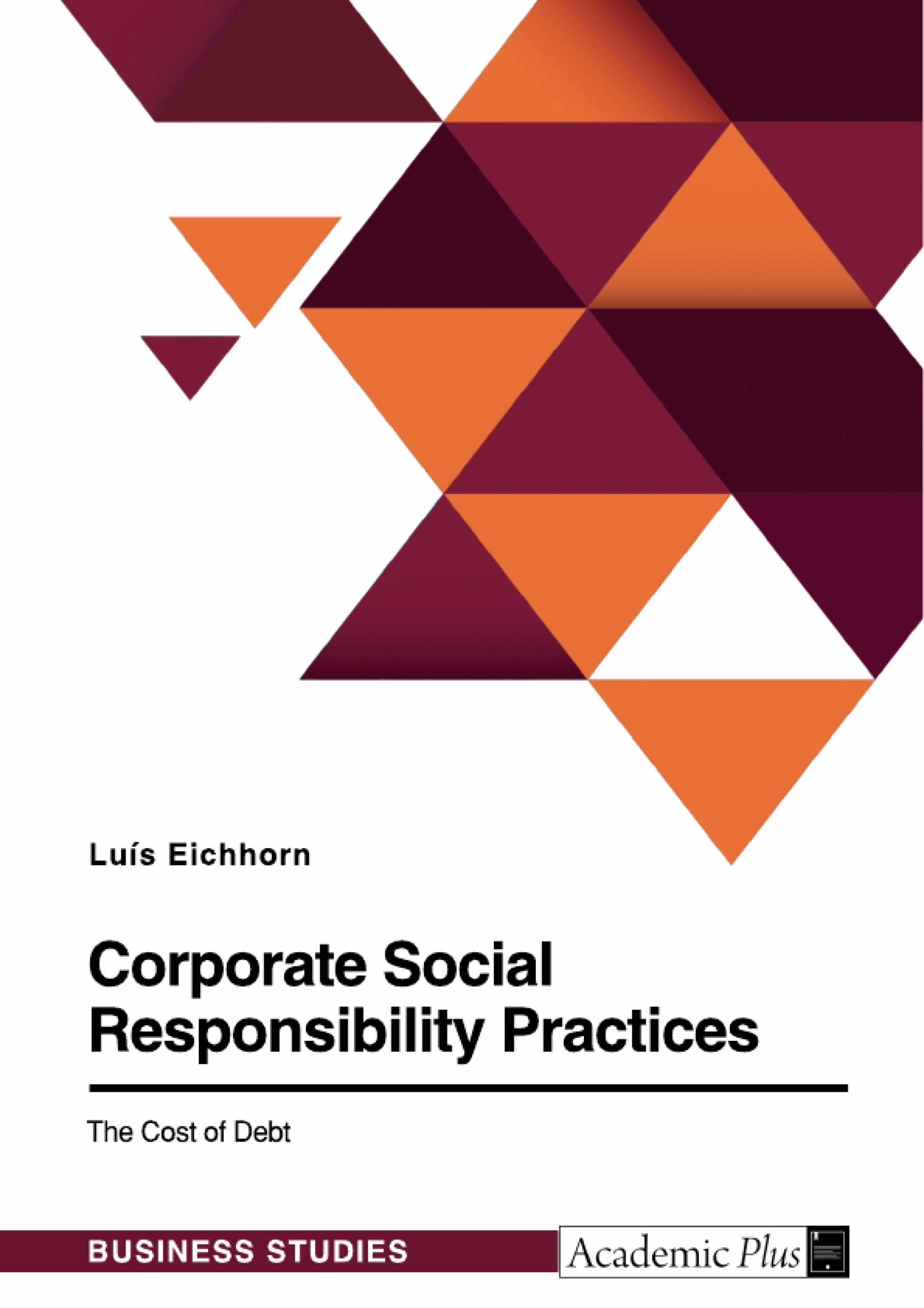This Master’s Thesis conducts a literature review of 32 studies, compiling the current knowledge about the impact of corporate social responsibility (CSR) practices, on companies’ debt costs, focusing on quantitative assessments.
The growing recognition of the role corporations play in addressing environmental and social challenges has been on the rise for several years. As businesses are increasingly being held accountable for their environmental and societal influence, the calling for active engagement in CSR issues is louder than ever before. Consequently, companies face a growing demand regarding CSR issues such as sustainability practices, social impact initiatives, ethical governance, and transparent disclosure of these. Apparently, the traditional sole purpose of profit-making and increasing shareholder value is evolving into a multifaceted commitment to diverse stakeholder demands.
CSR awareness and reporting on it have gained a lot of momentum in the last two decades. “2020 survey identified that 80% of N100 companies worldwide (the top 100 companies by revenue in 52 countries and jurisdictions) now report on sustainability, up by 5% since the last survey in 2017, while the reporting rate has reached 90% or more for the G250 group (the world’s largest 250 companies by revenue) since 2011”.
Within this context, the financial implications of CSR practices, particularly their impact on companies’ ability to finance operations and expansion plans, emerge as a critical area for investigation. A relatively unexplored aspect is the effect on companies’ debt, which marks the primary focus of examination in this thesis.
Inhaltsverzeichnis (Table of Contents)
- Introduction
- Problem Statement and Contribution of Research
- Structure of Thesis
- Background Information and Theories
- Description of Sustainability Terminology
- Sustainability
- CSR
- ESG
- Theories Pertaining the CSR-CoD Relationship
- Stakeholder Theory
- Legitimacy Theory
- Agency Theory
- Institutional Theory
- Regulatory Circumstances of CSR Disclosure
- Selected Regional Regulatory Circumstances
- Selected Reporting Initiatives
- CSR Disclosure Trending from Voluntary to Mandatory
- Alignment of Theories and Regulatory Circumstances
- Methodology
- Clarification of Factual Content of Scope
- Procedure of Literature Research
- Quality Assurance and Limitations
- Literature Review Results
- Literature Information
- Measure Specifications of CSR
- CSR Terminology in the Literature
- Scope and Focus Areas of CSR
- CSR Practices – Performance and Disclosure
- Data Sources and Composition for Sustainability Measures
- Measure Specifications of Cost of Debt
- Debt Measure Variables
- Data Sources and Definitions of Debt Measures
- General Sample Information
- Temporal Profile
- Methodological Approaches
- Geographical and Sectoral Distribution
- Impact of CSR Practices on CoD
- Overview
- Comprehensive CSR Measures on the CoD
- Individual Pillars of Comprehensive CSR Measures
- Individual Singular CSR Dimension Measures
- Summary Tables and Interim Conclusion
- Discussion and Future Avenues of Research
- CSR Measurement and Validity Issues
- Debt Measures and Debt Instruments
- Sample Characteristics
Zielsetzung und Themenschwerpunkte (Objectives and Key Themes)
This Master's Thesis aims to provide a comprehensive overview of the existing literature on the relationship between corporate social responsibility (CSR) practices and the cost of debt (CoD). The focus is on quantitative assessments, examining the impact of both CSR performance and disclosure on companies' debt costs. By analyzing a range of studies, the thesis seeks to contribute to the existing knowledge base in the field of CSR and its financial implications.
- The impact of CSR practices on companies' cost of debt
- The relationship between CSR performance and disclosure and debt costs
- The application of various theoretical frameworks to understand the CSR-CoD relationship
- The influence of regional regulatory circumstances on CSR disclosure and its impact on debt costs
- The potential for future research avenues in the field of CSR and its financial implications
Zusammenfassung der Kapitel (Chapter Summaries)
- Introduction: This chapter introduces the problem statement, highlighting the significance of investigating the relationship between CSR practices and the cost of debt. It outlines the research contribution and provides a detailed structure of the thesis.
- Background Information and Theories: This chapter delves into the relevant theoretical foundations and conceptual frameworks that underpin the research. It begins by defining key sustainability terminology, including sustainability, CSR, and ESG. It then examines several theories, including stakeholder theory, legitimacy theory, agency theory, and institutional theory, which offer insights into the relationship between CSR and CoD. Finally, it explores the regulatory circumstances surrounding CSR disclosure and its evolution from voluntary to mandatory practices.
- Methodology: This chapter outlines the research methodology employed in the thesis. It clarifies the scope of the literature review, explains the procedure for conducting the literature search, and discusses the measures undertaken to ensure quality assurance and address limitations.
- Literature Review Results: This chapter presents a comprehensive review of the existing literature on CSR and its impact on CoD. It begins by providing an overview of the information gathered from the literature, including sample characteristics, temporal profiles, and methodological approaches. The chapter then analyzes measure specifications for both CSR and CoD, examining the terminology, scope, and data sources used in different studies. Finally, it explores the impact of CSR practices on CoD, focusing on the effects of comprehensive CSR measures, individual CSR dimensions, and specific singular CSR measures.
Schlüsselwörter (Keywords)
This thesis explores the relationship between corporate social responsibility (CSR) practices, environmental, social, and governance (ESG) factors, and the cost of debt. It examines the impact of CSR performance and disclosure on companies' debt costs, utilizing a wide range of quantitative assessments. The analysis delves into various theoretical frameworks, such as stakeholder theory, legitimacy theory, and agency theory, to understand the underlying mechanisms driving the CSR-CoD relationship. The study also considers the influence of regulatory circumstances and reporting initiatives on CSR disclosure practices. Key research themes include sustainability, corporate social responsibility, ESG performance, disclosure, cost of debt, and literature review.
- Quote paper
- Luís Eichhorn (Author), 2023, Corporate Social Responsibility Practices. The Cost of Debt, Munich, GRIN Verlag, https://www.grin.com/document/1432015



